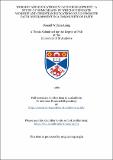Worship and education in faith development : a study of some means by which corporate worship and christian education could promote faith development in a community of faith
Abstract
A central objective of many Christian churches is to help persons develop an increasingly mature faith. This thesis is a study of some means by which corporate worship and Christian education could promote faith development in a community of faith. After identifying certain background considerations, the writer examines and compares the writings of four worship scholars and subsequently the works of five Christian education scholars. Two recent theories of faith development are examined and compared with other carefully researched psychosocial and moral development theories. It is contended that, given the proper environment and necessary encouragement, a person's faith may expand or develop through at least four identifiable styles: experienced faith (in early childhood), affiliative faith (in childhood), searching faith (during adolescence) and mature faith (in adulthood). Through worship and education, the church plays a significant role in the provision of the required environment and encouragement. However, since the church is an all age community, persons have vastly different needs and abilities at various developmental stages; this indicates limitations and opportunities for both intergenerational and peer group worship and education paradigms. Within this context, the writer develops definitions of worship and Christian education: Worship is our coming together in faith, responding to God's revelation in Jesus Christ and celebrating life in God's world; Christian education is a deliberate process employed by the community of faith to assist persons at each stage of their lives to develop in faith and to make personal decisions by hearing, reflecting upon, understanding, sharing and applying the word of God in their individual and corporate lives. Features of worship and education are compared and contrasted in the light of their ability to meet various faith development needs of persons during each faith style. From this study, the writer develops thirty-one criteria for faith development; these working hypotheses are subsequently employed to examine two worship and two education paradigms, one each in a Scottish church and three North American churches, and next to study four curricula that are designed for persons at each faith style. The criteria are then used to outline congruent congregational leadership styles and organizational patterns. Carefully established criteria for faith development are potentially significant instruments for evaluating or developing worship and educational paradigms in a congregation. Their application could indicate major changes to existing procedures or the provision of a variety of paradigms to meet a variety of needs and tastes.
Collections
Items in the St Andrews Research Repository are protected by copyright, with all rights reserved, unless otherwise indicated.

